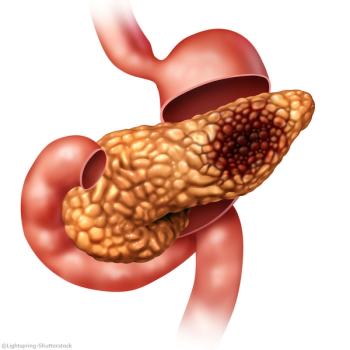
Sunitinib Approved as First Anti-VEGF Treatment for Advanced Pancreatic Neuroendocrine Tumors
Sunitinib (Sutent) has been approved as the first anti-VEGF (vascular endothelial growth factor) agent for neuroendocrine tumors (NET) in patients with unresectable locally advanced or metastatic disease.
Sunitinib (Sutent) has been approved as the first anti-VEGF (vascular endothelial growth factor) agent for neuroendocrine tumors (NET) in patients with unresectable locally advanced or metastatic disease.
Ball-and-stick model of the sunitinib molecule, C
22
H
27
FN
4
O
2
Pancreatic NET, which accounts for about one-quarter of all neuroendocrine tumors but only 5% of pancreatic cancers, is a rare and difficult-to-treat cancer reported in two to four people per million each year globally. Nearly 90% of patients with pancreatic NET are initially diagnosed with locally advanced or metastatic disease. Prognosis is poor, with a survival time of only 1 to 3 years.
An oral multikinase inhibitor, sunitinib blocks multiple molecular targets implicated in cancer cell growth, proliferation, and spread of metastasis. Two important targets of sunitinib are the VEGF receptor and PDRF (platelet-derived growth factor) receptor, which are expressed by a wide variety of solid tumor types and believed to play a key role in angiogenesis. Sunitinib also inhibits other targets, including KIT, FLT3, and RET, that are important to tumor cell growth. It was approved by the US Food and Drug Administration (FDA) in 2006 for treatment of patients with advanced renal cell cancer (RGG) and imatinib (Gleevec)-resistant or intolerant gastrointestinal stromal tumor (GIST).
The current approval of sunitinib in patients with pancreatic NET was based on FDA assessment of progression-free survival (PFS) observed in SUN 1111, a multicenter, international, randomized, double-blind, placebo-controlled phase III study (n = 171) evaluating single-agent sunitinib in patients with unresectable pancreatic NET. Use of somatostatin analogs was permitted in the study. The primary study endpoint was PFS. Other endpoints included overall survival (OS), objective response rate (ORR), and safety.
FDA-reviewed data from SUN 1111 showed that treatment with sunitinib yielded a clinically significant improvement in PFS compared with placebo (10.2 vs 5.4 months, P = .0001) in this patient population. Sunitinib also yielded a statistically significant improvement in tumor response, with an ORR of 9.3% (95% CI: 3.2, 15.4; P = .0066). No objective responses were observed with placebo. Although OS data were not mature at the time of final analysis, there were 9 deaths among patients in the sunitinib arm vs 21 deaths in the placebo arm.
“This approval is welcome news for physicians who have struggled to find a treatment option that shows a substantial clinical benefit in treating advanced pancreatic NET,” said SUN 1111 principal investigator Dr. Eric Raymond, who is professor of medical oncology and head of University Department of Medical Oncology (Service Inter Hospitalier de Cancerologie) Bichat-Beaujon, Clichy, France. “Pancreatic NET is a highly vascular tumor, and as the first anti-VEGF therapy approved for this disease, Sutent represents a treatment that attacks a key component of tumor growth.”
Safety issues with sunitinib include hepatotoxicity, which may be severe and has been observed in clinical trials and post-marketing experience. Liver function tests need to be monitored before initiation of therapy, during each cycle of treatment, and as clinically indicated; treatment should be interrupted for grade 3 or 4 drug-related hepatic adverse events and discontinued if there is no resolution.
Decreases in left ventricular ejection fraction to below the lower limit of normal and cardiac failure, including death, have been observed with sunitinib. Patients with concomitant cardiac conditions should be carefully monitored for clinical signs and symptoms of congestive heart failure. Patients also should be monitored for hypertension and treated as needed with standard antihypertensive therapy. Complete blood counts with platelet count and serum chemistries should be performed at the start of each treatment cycle for patients receiving sunitinib.
The most common adverse reactions associated with sunitinib in GIST, RCC, and pancreatic NET clinical trials were diarrhea, fatigue, asthenia, nausea, mucositis/stomatitis, anorexia, vomiting, neutropenia, hypertension, dyspepsia, abdominal pain, constipation, rash, hand-foot syndrome, skin discoloration, hair color changes, altered taste, and bleeding.
Newsletter
Stay up to date on recent advances in the multidisciplinary approach to cancer.






































